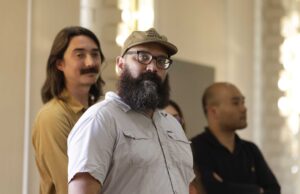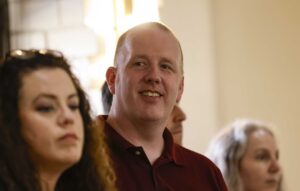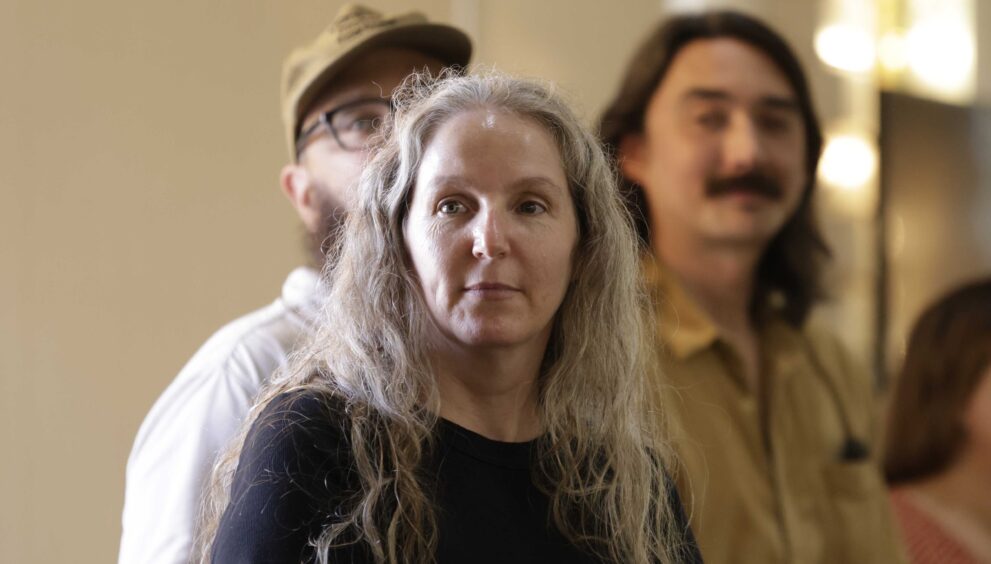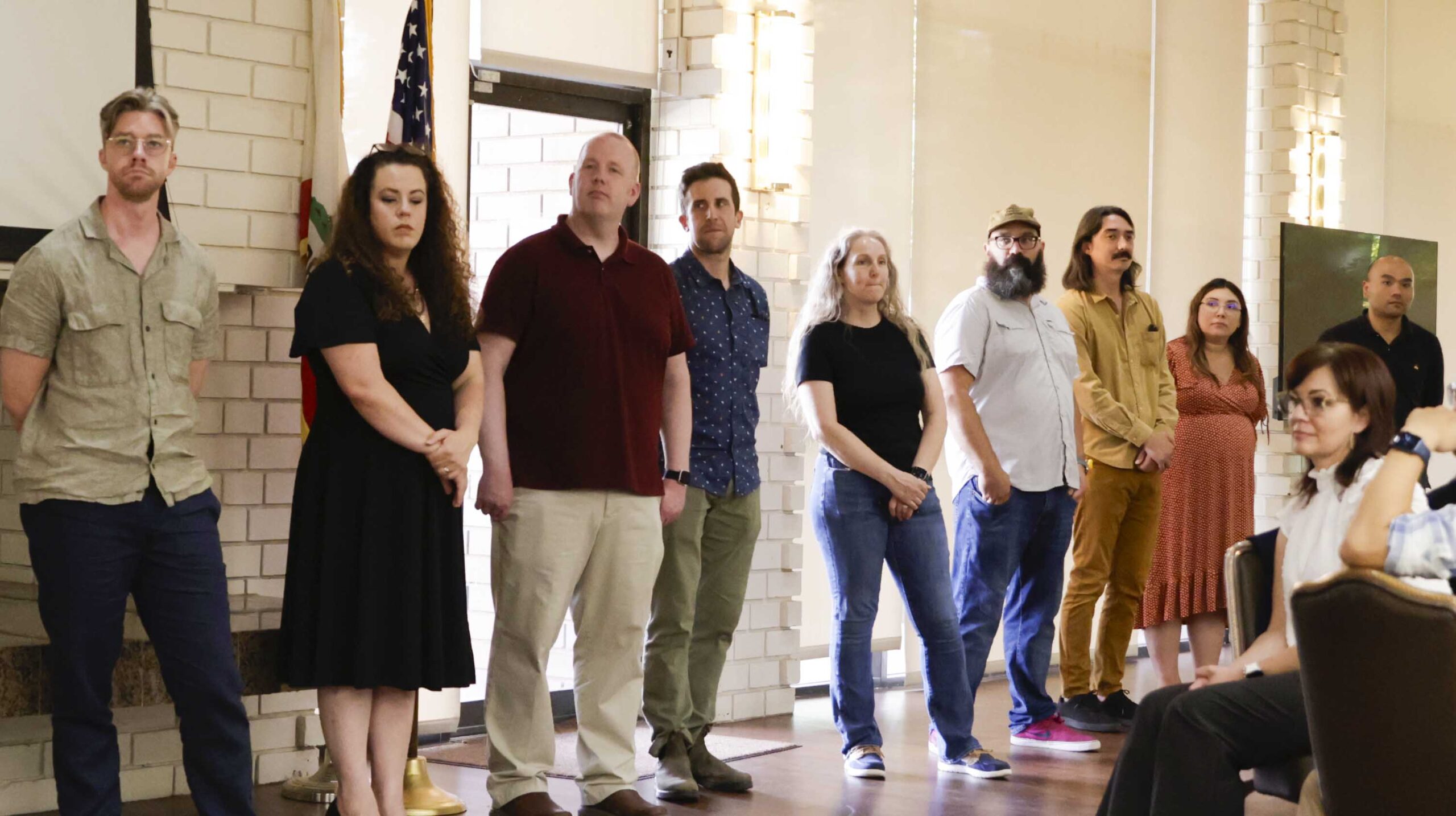Recently promoted professors in the College of Science and Mathematics have demonstrated exceptional commitment to students, service to the university and contributions to their respective fields.
Dr. Karine Gousset in Biology has excelled in teaching and made transformative contributions to research. Her proactive leadership during the COVID pandemic and dedication to graduate student success highlight her positive and collaborative approach.
She was recently named chair of the biology department.
Dr. David Lent, also in Biology, stands out for his innovative teaching philosophy emphasizing critical thinking. His collaborations with Fresno Chaffee Zoo and his holistic approach to integrating teaching and research have been recognized for their impact.
Dr. Joseph Ross, another Biology professor, has focused on creating dynamic and inclusive learning experiences. His implementation of Course-based Undergraduate Research Experiences (CUREs) and his commitment to diversity in STEM education underscore his leadership and impact.
Dr. Ross’s recent appointment as the inaugural Dr. Virginia Eaton Endowed Chair in Genetics and Molecular Biology reflects his amazing work.
Dr. Cory Brooks, from Chemistry and Biochemistry, has significantly contributed to undergraduate research experiences, pushing for meaningful engagement and hands-on learning. His research endeavors in antibody engineering and his successful grant acquisitions demonstrate his dedication to both teaching and research.
Dr. Mara Brady in Earth and Environmental Sciences has emerged as a change agent, promoting diversity and inclusion in STEM education. Her interdisciplinary research and commitment to equity have earned her leadership roles and funding recognition.
Dr. Spee Kosloff, in Psychology, has shown a remarkable ability to engage students through active learning. His research in social psychology, particularly exploring how individuals cope with existential concerns, has been prolific and impactful. His musical talent as a jazz upright bass player adds a unique dimension to his profile.
Below, find more about them in their own words and from the eyes of reviewers.
Dr. Karine Gousset: Biology
From Dean Dr. Christopher Meyer (Early Promotion): Her successful teaching philosophy emphasizes critical thinking, creative problem-solving, and collaboration to catalyze a “fire and passion for biology” in students.
Notably, she continues to grow and evolve as a teacher-scholar via feedback from her colleagues and students, by actively participating in professional development workshops and seminars on teaching pedagogy and effectiveness, and by studying the STEM education literature.
Dr. Gousset continues to effectively teach across the curriculum, including extensive lower division courses such as Introductory Microbiology (BIOL 20, often ~180 students) and Introductory Biology (BIOL 1A, typically +250 students) as well as critical upper division courses (such as Molecular Virology (BIOL 119, ~20 students) as well as graduate courses.
She was one of the most proactive faculty leaders in getting graduate students safely back into “re-opened” labs during COVID to complete their MS degrees, working effectively with the Dean’s Office and Environmental Health and Safety. Her continuing transformative research has resulted in a recent NIH NIGMS SC1 grant award for $1,286,000 (2021-25) to support her project “Deciphering the molecular mechanisms of TNT formation and function using a multi-omic approach,” pushing her total funding from NIH as a CSU faculty member to over $1.7M.
Dr. Gousset uses various modern techniques in her eclectic approaches, including bioinformatics, proteomics, structural biology, microscopy, and virology tools. It is hard to overestimate the importance of this exciting area of research on a novel mechanism of cell functional connectivity involved in virus spread (including HIV), misfolded proteins, and cancer proliferation and persistence – conditions that affect the health of millions of Americans.
Beyond her teaching, she did an extraordinary job as co-chair of our college Ad Hoc Research Infrastructure Committee, which resulted in a critical report shared with all campus stakeholders that identified challenges and potential solutions to enhance research on campus for student and faculty success. Her positive, energetic, organized, and collaborative approach inspired this large and diverse committee (including faculty and staff from different departments) and brought out the best in her colleagues.
Dr. Gousset’s reflects on what drives her teaching spirit
What is most satisfying for me is seeing the success of my research students post-graduation.
- Stacy Han, my first undergraduate student, recently graduated from UCSF School of Medicine and has successfully entered residency.
- Alan Pham, another undergraduate from my lab, was also accepted to UCSF School of Medicine and is starting his 2nd year.
- Puneet Sran, a Biology Honors undergraduate student, was accepted to the UC Davis School of Medicine.
- Rekha Rangan, another Biology Honors undergraduate student, graduated from the Biotechnology program at UC Irvine.
- Another undergraduate student from my lab, Pablo Guaman Tipan, is currently a Ph.D. student at the University of Texas, Austin.
Graduate students
- Similarly, my first Biology graduate student, Shravan Kannan, was hired as a Research Associate at Dynavax, Berkeley, CA, and is now a Ph.D. student at the University of Iowa.
- Shivalee Gujarathi, my first Biotech graduate student, moved up the ladder at Thermo Fisher Scientific and took a Clinical Trial Manager position at Guardant Health.
Seeing their growth from students to scientists is beyond rewarding, which is why I came here. I come from a pure research background and had a permanent Scientist position at the Pasteur Institute. But, I felt unsatisfied, except for when I was mentoring young researchers.
Finally, I decided to do something about it and began looking for positions in the spring/summer of 2012. The first ad I saw was from Fresno State looking for a Virologist. Unfortunately, as my excitement built by reading the ad, my hope was crushed when I noticed the application date had passed.
Strangely, the ad reappeared in September, and the rest is history. If I believed in fate, this could be evidence that it existed.
Fun Fact Not in CV:
I am most proud of my children. One of my daughters graduated from Stanford with a degree in Computer Science and is now working for Atlassian (the Google of Australia) in Chicago. My other daughter will start her second year at Stanford as a Materials Science and Engineering student. She is currently conducting summer research in the Chueh Lab, which works on battery technology. Finally, my youngest is starting junior high, a big and scary step in his academic career. I hope he finds his niche and grows to find something he loves.
Finally, my hobby is trying to learn new languages, right now, specifically Korean.
Dr. David Lent: Biology

From Dean Dr. Christopher Meyer:
Dr. Lent’s teaching philosophy focuses on providing students with a conceptual framework for understanding biology (as opposed to memorizing facts) and developing critical thinking and communication skills. It is wonderful to hear that Dr. Lent received such positive feedback from former students that the course “put them way ahead of their peers” in medical school.
His innovative collaborations with the Fresno Chaffee Zoo have been transformative for BIOL 174 (Animal Behavior) students, which he taught as a high-level Course-based Undergraduate Research Experience (CURE).
He is a deep thinker and leader in integrating teaching and research via a holistic and interdisciplinary lens. Outside the classroom, he has been an extraordinary research mentor to over 60 undergraduate and nearly 30 graduate students, typically working with over 20 students a semester.
Dr. Lent is a highly innovative and creative interdisciplinary scientist whose research has expanded beyond his funded NSF CAREER award area of perception, learning, and memory to include neural and behavioral deficits (in collaboration with Dr. Ellen Woo in Psychology), development of novel insect repellents for agriculture (with Dr. Santanu Maitra in Chemistry and Biochemistry) and interdisciplinary biology education (with Dr. Ali Hansen in Biology; partly included in his NSF CAREER work).
The reviewer appreciated his post-tenure focus on university service, where he has enormously impacted research and graduate education as part of the provost-appointed Academic Affairs Strategic Implementation team. Dr. Lent’s integration of teaching, research, and service in his work with the National Parks Service and Fresno Chaffee Zoo is impressive. It serves as a vibrant model for other faculty.
Dr. Lent’s Personal Statement
My most meaningful experience is my NSF CAREER. Having more than 10 of my undergraduate and graduate students go on to Ph.D. programs.
I chose Fresno State because of the people and the emphasis on balancing research and teaching. I enjoy the freedom to explore different ideas for my research and don’t feel the pressure of being that person who does that one type of research that a lot of my peers feel at R01s.
Fun Facts Not in CV:
My hobbies include hiking and camping. I enjoy time and support from my partner and my two corgis.
Dr. Joseph Ross: Biology

From Dean Dr. Christopher Meyer: He has impressively created and developed a dynamic custom course textbook since his tenure and promotion. Dr. Ross’s comprehensive textbook includes the curation of open-access primary research literature sources for students, custom lecture videos (many using Fresno State “lightboard” technology), among many other innovative features, all at no cost to students (from his work as a featured Affordable Learning Solutions (AL$) faculty fellow).
Dr. Ross has done fantastic work in a vastly improved and redesigned BIOL 104 (Genetics and Cell Biology Lab), where he has implemented Course-based Undergraduate Research Experiences (CUREs), which democratizes exposure to the High-Impact Practice of research, engaging over 800 students.
He is a recognized leader in CUREs development and implementation, both on campus (where he designed and led a CUREs workshop for faculty from CSM, LCOE, and JCAST as part of our “STEAM: Enriched Pathways” Title VA award), in the CSU system (he has presented his research and CUREs work at several CSUPERB meetings), and nationally (Dr. Ross has made several presentations at national conferences. He is a collaborator on an NSF-funded project for which he has developed research ethics instructional modules to integrate with the BIOL 104 curriculum).
Additionally, Dr. Ross clearly articulates the growth and expansion of his research beyond his exciting work in experimental evolutionary genetics, which includes STEM education. As mentioned earlier, his work in CUREs and student understanding of bioethical issues is fascinating and strongly impacts student growth and development.
His reflections on the impact of COVID on research mentoring and productivity are insightful, and his successful efforts to re-frame research and re-engage students are inspiring.
A major source of support for his students and the research comes from his successful NIH R15 AREA grant award (2017-2022), “Genetic Basis of Sperm Mitochondrial Elimination.” Dr. Ross’s continued funding by NIH is impressive (as an Assistant Professor, he was also awarded an NIH grant) and reflects his productivity and accomplishments.
For several years, Dr. Ross has served as the advisor for the Fresno State chapter of the Society for the Advancement of Chicanos and Native Americans in Science (SACNAS). Our students routinely present their work at SACNAS meetings, a transformative experience that includes mentoring and networking opportunities and are frequently recognized with research awards.
Overall Evaluation and Recommendation: Dr. Ross has made outstanding contributions to Fresno State as a scholar, mentor, teacher, builder, and leader. His interdisciplinary perspective and successful efforts to integrate teaching and research are inspiring. Dr. Ross’s recent appointment as the inaugural Dr. Virginia Eaton Chair in Genetics and Molecular Biology reflects his amazing work.
Dr. Ross’s reflections
Meaningful achievement
Publishing peer-reviewed manuscripts with student authors has been a personal honor. For one of my former students who was the first author of a manuscript, I just today provided a recommendation letter to support their invitation (after a Zoom interview) to an in-person interview to work in the research lab of a Nobel Prize-winning scientist currently at Berkeley (after this former PSMBt student has been employed by Thermo Fisher in the Bay Area for the last few years, incidentally). Their opportunity to interview has all to do with the former student (and not with me). Still, it is immensely satisfying to see the next generation of professionals doing so well and to be able to support their career growth.
Contributions to Fresno State
Having the support to develop the BIOL 104 CURE has been incredibly satisfying and impactful, especially when I was then able to merge two of my professional areas of interest (training students in conducting research and training students in the ethical conduct of research) when I was offered a competitive position as an ENCOUR (Ethics Network for Course-based Undergraduate Research) fellow.
Through that NSF-funded program, I developed research ethics training materials and integrated them into BIOL 104, and in the most recent two years, I was invited to be a peer mentor to help other faculty across the USA accomplish the same goal.
Fun Facts Not in CV:
Regarding other interests/hobbies, I was a freelance graphic designer and professional wedding photographer during my high school and undergraduate summers.
Those experiences and skills have helped me as a scientist to create graphics and figures to accompany scholarly work, become good at manipulating photographs and data visuals, and help others understand what they should and should not do while representing data visually and according to ethical guidelines.
In an era of potentially burgeoning deepfakes and AI, it is essential to maintain a heightened level of skepticism and critical analysis of what we see with our eyes. We can no longer always trust our five senses: what we see can be manipulated. I’m looking forward to leveraging my experiences to help our students understand how to analyze and interpret even data-based claims.
Dr. Cory Brooks: Chemistry and Biochemistry
From Dean Dr. Christopher Meyer:
Dr. Brooks’s time and commitment to implementing and evolving novel Course-based Undergraduate Research Experiences (CUREs) into CHEM 156 (Biochemical Lab Techniques) impressed reviewers.
His innovative work resulted in a transformative experience for students, student conference presentations, a new lab manual, and grant funding. In addition, his development of new course content in CHEM 140T (Introduction to Biomedical Research) to expose students to the biomedical research ecosystem, including grant writing, data analysis, scientific communication, and innovative assignments, including case studies and peer reviews, adds considerable value to the curriculum.
Dr. Brooks is a highly talented and productive structural biologist focusing on antibody engineering – a critical area of research with broad applications in medical biotechnology.
When it comes to attracting funding, Dr. Brooks is also a proven “rainmaker,” having secured several grants since tenure, most notably at the international level (National Research Council of Canada), national level (NIH), state level (CSUPERB), and from industry (OncoQuest Inc. and Quest Pharmatech Inc).
Additionally, Dr. Brooks’s continued support from the NIH is proof of the high caliber and significance of his research. His regular service as a judge for student posers and oral presentations at the Central California Research Symposium is admirable.
Dr. Brooks’s reflective statement:
The experience over the past few years that has been the most meaningful has been watching the success and achievements of my research students. Many of my former students have pursued Ph.D. programs or careers in biotech companies. The most rewarding part of being a professor is providing opportunities for our students to grow, succeed, and explore what they are passionate about in the sciences.
Fun Facts Not in CV:
Outside of my professional life, I am an avid rock and mountain climber. I spend most of my time climbing in the Sierra Nevada and other mountain ranges worldwide. I also enjoy hiking in the local mountains with my wife, Teresa, and our 2 little dogs, Chubbs and Peanut.
Dr. Mara Brady: Earth and Environmental Sciences
From Dean Dr. Christopher Meyer: She effectively describes her activities and accomplishments in serving students by engaging in diversity and inclusion training and leadership development, a critical need for her department and STEM in general.
She is a powerful “faculty change agent” who authentically supports the “widespread adoption of teaching practices that promote diversity and inclusion.” She documents a phenomenal amount of professional development in this area, including engagement with URGE (Unlearning Racism in the Geosciences), which led to her co-facilitating the Equity-Minded Pedagogy Faculty Learning Community, launched in Summer 2022, that promises to “move the needle” in closing equity gaps, enhancing culturally relevant teaching, and inclusion.
She is an innovative and creative teacher-scholar leader committed to implementing evidence-based, High-Impact Practices in the classroom. Outside the class, she has been an extraordinary research mentor to several undergraduate and graduate students who are included as co-authors on peer-reviewed publications and presentations at professional meetings.
She also has had success in helping students secure research funding, and numerous awards have recognized her students. She has also mentored and advised high school students and internship students.
Dr. Brady is a highly innovative and productive interdisciplinary scientist who has expanded her research in sedimentology and paleobiology to leverage better nearby field locations that are highly relevant to climate change challenges.
Her work will facilitate the engagement of more students in research and integrate the research findings into courses. Her nomination and election have recognized her leadership in research as President of the Pacific Section of the Society for Sedimentary Geology.
Her persistence is admirable and is highlighted by major funding from NSF in 2021 and the CSU Student Success Network grant. Her NSF grant includes support for developing and sustaining community-based research projects that are both locally relevant and globally important, which connects her teaching and research.
She did outstanding work as a Lead Faculty of the CSM BOND Program, bringing people together across divisions (including Student Affairs, OIE, and Facilities) to work together in mutually reinforcing ways toward the common goal of student success.
Under her collaborative leadership, the BOND Program has successfully diminished achievement gaps and increased graduation rates. She continues to build relationships across the campus and beyond by engaging in Bold Ideas teams and as PI of the NSF GEOPaths and Equity Action grants.
Dr. Brady’s self-reflection
I’m most proud of the collaborations and connections I’ve built across campus regarding diversity and equity work. Not one specific accomplishment, but those have been most meaningful to me.
Fun Facts Not in CV:
I used to Irish dance in the past. I toured around the country performing in theatres and was part of a team that won the world championships – we were the first Americans to achieve that feat at the time. I still credit my Irish dance career with helping instill the confidence, teamwork, and discipline needed to be successful as a scientist and teacher.
Dr. Spee Kosloff: Psychology
From Dean Dr. Christopher Meyer
The reviewer appreciated Dr. Kosloff’s skills at “weaving in new material in ways that speak more directly and experientially to students’ personal and social lives” and his work to “amplify student engagement and interest while remaining scientifically rigorous.”
His deliberate and successful effort to engage students in active learning and High-Impact Practices (including integrating teaching and research) is phenomenal.
He has successfully developed innovative new coursework since tenure, including a graduate-level course in Social Psychology (Psych 255T) and a fascinating honors course for the Smittcamp Family Honor’s College entitled Human Fragility and Cultural Transcendence (HON 13), which “adopts an interdisciplinary lens to explore a explore a paradoxical feature of human being, at once fragile, and yet also culturally embedded, potentially heroic agents.”
Dr. Kosloff describes some of his current fascinating research projects that authentically involve his students, including studying cultural variation/” contingencies of self-worth,” the relationship between prejudice and various forms of religious orientation, and the phenomenon of “informational blindness” – all significant and relevant.
He has continued to be an active researcher, publishing and presenting in several venues. His leadership as Chair of the College of Science and Mathematics Research Committee is deeply appreciated.
He has consistently energized the committee and the Dean’s office to think more deeply about the intersection between research and community engagement.
A personal reflection from Dr. Kosloff
Atop the list of my most meaningful achievements, I would place my work to forward scientific understanding of how people attempt to mask the fear of death by maintaining faith in preferred ideologies and cultivating culturally grounded senses of personal heroism in everyday life.
In 25 publications over 17 years (including 13 empirical works and 12 book chapters), I have assessed the unconscious nature of such processes, endeavoring to illuminate the impact of existential concerns on political behavior, close relationships, and the valuation of external indicators of worth (such as money and fame), among other topics.
This work has been the foundation of several courses I developed at Fresno State, including a general education class for the Smittcamp Family Honors College, which itself has inspired the book I am currently writing while on sabbatical, entitled “Human Fragility and Cultural Transcendence: An Interdisciplinary Exploration of the Foundations and Future of Human Social Existence.”
Fun Facts Not in CV:
I have played jazz upright bass since age 16. I am an active performing musician in the Fresno jazz scene, playing gigs regularly throughout town and collaborating with many talented jazz musicians, including as the bassist on the the 2018 album of Fresno State’s own Dr. Ben Boone, “The Poetry of Jazz,” featuring live poetry readings from the 2011 national poet laureate Philip Levine.
In 2022, I also released my debut album, “The Quarantet Project,” which is available on Spotify and other major streaming platforms.

